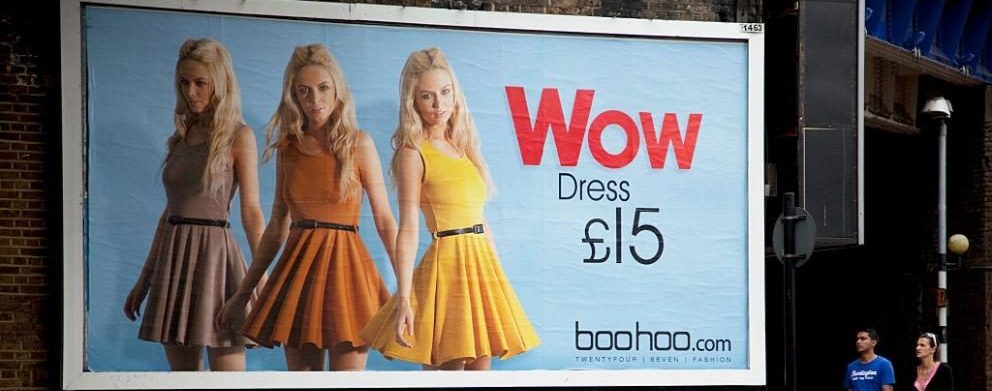04 Aug 2020 Boohoo received good ESG ratings despite exploitation of modern slavery in its supply chain
The modern slavery case at Boohoo shows the importance of investigating firms’ ESG practices more deeply.
The Manchester-based online fast-fashion retailer Boohoo has launched an independent review of its domestic supply chain after the Sunday Times published an investigation affirming that workers manufacturing its products at a factory in Leichester were paid less than half the minimum wage set by the British law. Additionally, the company in question was operating during the coronavirus lockdown without proper social distancing and hygiene measures, one of the reasons why an outbreak of Covid-19 in the region has been likened to the garment district of the city.
Following the allegations, Boohoo’s share price has fallen significantly, loosing £1.7 billion of value on the stock market. Major retail brands, such as Amazon, Next and Asos, have removed all the company’s garments from their sale offers. Investors have also taken actions. Boohoo’s third-largest independent shareholders, Standard Life Aberdeen, sold almost all its stock criticizing the retailer’s weak response to the claims.
Questions have been raised regarding the fact that responsible funds owned shares of the company and that Boohoo had passed ESG screening controls successfully, receiving ratings considerably above the industry median. MSCI had rated the company with a double A (its second-highest ranking), pointing out that Boohoo had supply-chain labor that exceeded the industry average. Sustainalytics had classified the firm as medium risk prior to the modern slavery scandal, due to “weak management” reasons and despite reporting that Boohoo was involved in “low-level” labor relations, it affirmed that the company had “very strong social supply-chain standards”.
Critics argue that a key problem with ESG ratings is that they rely on data provided by companies, especially in the case of small businesses, underlying also the importance of investigating social practices and governance factors as much as environmental credentials on which generally most of the focus is put on.
“Labour exploitation in Leicester’s garment industry was an open secret in the UK. ESG Rating providers need to take into consideration so many local aspects in order to validate their judgment and make a reality check to companies’ public data. An ESG analyst needs to understand both the local and global topics and to have seniority, otherwise, ESG ratings are not useful to orientate investors” states Daniela Carosio, Senior Partner of Sustainable Value Investors. “The fashion supply chain has severe issues almost everywhere and the longer the chain the most severe the ESG topics, particularly in developing countries such as India and Bangladesh. So-called ‘Responsible Funds’ need to have an engagement strategy with companies they invest in, to disinvest when the scandal broke out is not an advisable exit strategy, to have a positive impact during the tenure of the investment is what makes the difference“.
For further information see the following links:
- https://www.ft.com/content/b6173433-853f-4b86-a50d-5f4933bc90c2
- https://www.thetimes.co.uk/article/boohoo-fashion-giant-faces-slavery-investigation-57s3hxcth
- https://www.ft.com/content/ead7daea-0457-4a0d-9175-93452f0878ec
- https://www.ft.com/content/84852c9e-c6be-11ea-9d81-eb7f2a294e50
- https://www.theguardian.com/business/2020/jul/26/boohoo-to-set-up-model-garment-factory-in-leicester
- https://www.theguardian.com/fashion/2020/jul/09/boohoo-shares-bounce-back-after-pledge-to-improve-factory-conditions
- https://www.independent.co.uk/news/uk/home-news/boohoo-leicester-factories-modern-slavery-boohoo-leicester-factories-modern-slavery-investigation-a9602086.html
- https://www.ft.com/content/48e02694-a54c-4cec-9af6-ada8b4955e20
- https://www.ft.com/content/e427327e-5892-11e8-b8b2-d6ceb45fa9d0

